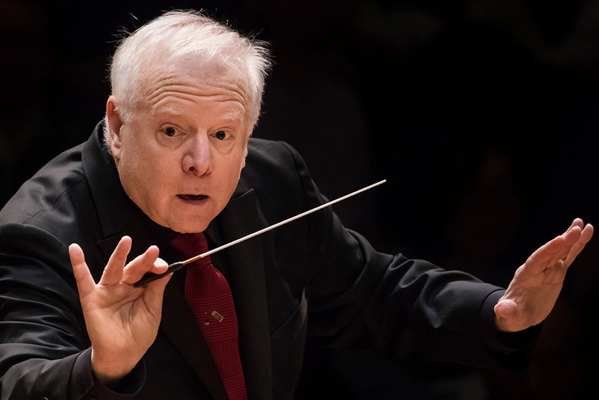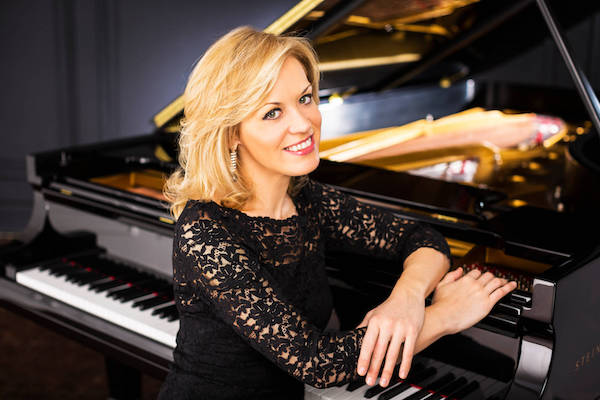Slatkin makes heartening NSO return with optimistic, eloquent Copland

The National Symphony Orchestra’s performances of American music have rarely sounded as assured and idiomatic as during the tenure of Leonard Slatkin. The American conductor, music director in Washington from 1996-2008, returned to the podium of the Kennedy Center Concert Hall Thursday night. The 75-year-old Slatkin lit a fire of fierce energy in a program consisting mostly of music by American composers.
To mark his milestone birthday year, Slatkin revisited a set of variations he premiered in 1996, taking for its theme Paganini’s famous Caprice No. 24. Slatkin approached orchestras where he has held long-term appointments to augment the piece with new movements from other composers. The new version, Yet Another Set of Variations (on a Theme of Paganini), is a smorgasbord of musical jokes, aphorisms, and occasional eloquence, largely contributed by American composers.
Slatkin’s own contributions, weaving together some of the movements, mixed in forearm clusters from piano and a sly transformation of the tune into the folk song “Hava nagila.” His closing “Quodlibet” movement, a reference to the pastiche of popular songs at the end of Bach’s Goldberg Variations, featured snippets of John Williams’s theme from Jaws, Gershwin’s “I Love Paris” and Concerto in F, and the 18th variation from Rachmaninoff’s Rhapsody on a Theme of Paganini. It did not include the “Dies Irae” chant that Rachmaninoff used, at least not in a detectable way.
In between came a manic galop variation by William Bolcom, a mephistophelian trill variation by Joan Tower, and a cinematic take by Daniel Slatkin, the conductor’s son. The most salient distillation of the tune came in Claude Baker’s variation, “Il regalo di Fornaio,” followed by a jazz-influenced variation by Cindy McTee, Slatkin’s wife, and a delightful danse macabre variation by John Corigliano.

Pianist Olga Kern made a belated NSO debut as soloist in Rachmaninoff’s Piano Concerto No. 1. Her big-boned octaves matched the blaring brass in the cinematic opening of the first movement. With a flinty touch she often raced ahead of the orchestra, but Slatkin quickly put the NSO back on track. She combined an intimate handling of the movement’s slower section with booming bass textures in the showy cadenza.
Plangent horn and oboe solos opened the second movement, a sentimental torch song. Slatkin’s careful attention to balance between piano and orchestra allowed Kern to weave delicate spiderwebs around the orchestral lines. Kern responded in increasingly manic ways to Rachmaninoff’s demanding fingerwork in the finale, growing from Mendelssohnian fairy flourishes to robust bursts of sound. A final virtuoso demonstration came in Kern’s blistering encore, Prokofiev’s Etude No. 4 in C Minor.
Slatkin was the last conductor to lead a performance of Aaron Copland’s Third Symphony with the NSO, back in 2008, and it was a joy to hear him return to it now. He is an expert Copland interpreter, having recorded a complete cycle of the composer’s ballet scores in recent years with the Detroit Symphony Orchestra, where he is now music director laureate. He described the work as “our symphony,” for Americans something like Beethoven’s Fifth Symphony, “a work of optimism” in the face of the horrors of World War II.
The soft woodwind and trombone solos and plush string sound of the first movement were beautiful, surpassed by Slatkin’s carefully built-up wall of sound at the brass-powered climaxes. Brazen horn calls and explosive brass response raised the temperature of the fleet second movement, while the tense duet of first and second violins set the mood of the third movement’s melancholy string serenade.
Copland used motifs from his Fanfare for the Common Man, composed a couple years earlier, in this symphony, most transparently in the fourth movement. The woodwinds presented the theme with elegant nostalgia, until it was taken up by the blazing brass and eventually the strings. Each time the fanfare music returned, it was prepared by Slatkin with spine-tingling efficacy, making for an exuberant finish to this American masterpiece.
The program will be repeated 8 p.m. Saturday. kennedy-center.org; 202-467-4600

Posted Dec 06, 2019 at 10:28 am by Bruce
A lovely review. Ms. Kern is an accomplished pianist. As you said, she all too often becomes manic. She seems to listen to herself without listening to the orchestra. Slatkin knows the Rach inside and out. Good that Slatkin took control when Kern, so often, lost control. I love Slatkin. Your reviews are insightful. You are the best.